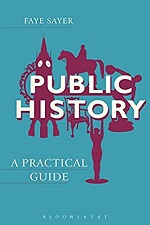Public History. A Practical Guide – SAYER (IJHLTR)
Faye Sayer /

What’s the point of history? In a time when the value of studying the humanities is often questioned this book provides a genuine attempt to analyse how history impacts on people’s lives. The book explains how the past connects with its public, discussing the role which interpretations play in contributing to social and cultural traditions alongside developing personal understanding. Public History is described as a dynamic undertaking involving dialogue between historians, the past and different audiences and Sayer provides detailed examples of how this occurs in different spheres.
Chapters focus on a different aspects of public history (e.g. museums, archives and heritage centres, teaching history, media history etc.) offering readers a comprehensive guide to a range of issues. The context of each chapter is explained in helpful introductions which are then followed by discussion, illustrated by specific case studies.
The variety of international case studies emphasises public history’s global importance and the different insights which can be achieved through its practice. Case studies provide opportunities for readers to engage with some of the challenges which public historians face and guided questions encourage them to reflect on their own positioning. The excellent range of references also permits readers to follow up in more detail on issues which have interested them.
This practical and informative book is an essential guide for those wanting to engage with the public history sector. It describes necessary qualifications and skills, and what work in the sector would entail. For those studying history it has a useful chapter providing advice on gaining employment.
This book also has wider appeal for the general public wanting to know how the history around them is constructed and interpreted including the influence of digital media and community history projects. Educators in schools would also find this informative book very helpful: its rationale for studying the subject and examples of how methods of enquiry and historical skills are utilised in practice are all very useful reminders of why history remains such an important subject on the school curriculum.
Penelope Harnett – Emerita Professor in Education at the University of the West of England, Bristol.
[IF]
